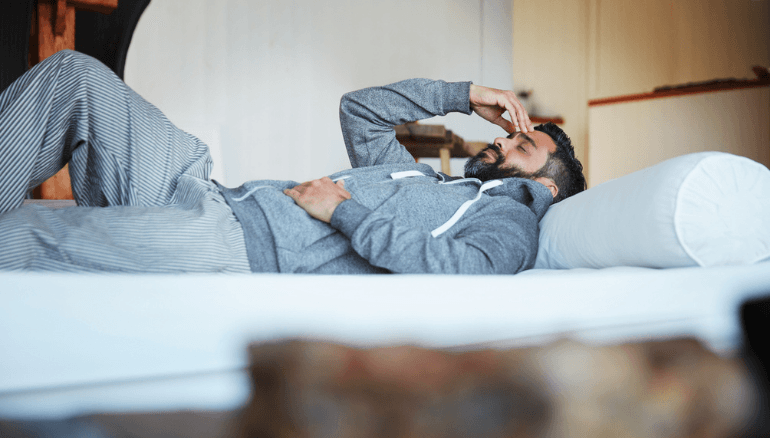Chronic pelvic pain syndrome (CPPS) is one of the most common urological conditions affecting men — particularly in their younger years — with diverse and distressing symptoms that can significantly impact their lives.
CPPS is still not well understood by health professionals, its causes aren’t known, and it can be difficult, if not impossible, to cure.
This can be a pretty despairing situation for many blokes, but greater recognition of the condition and getting help from a few different types of healthcare professionals can help.
What is chronic prostatitis or chronic pelvic pain syndrome?
Chronic prostatitis or chronic pelvic pain syndrome is a type of inflammation of the prostate gland without an identifiable bacterial infection.
It’s characterised by a diverse range of symptoms — both in type and severity — that affect the pelvis, perineum, scrotum, rectum, testes, penis and lower back.
These can include genital or abdominal pain or discomfort, lower urinary tract symptoms (such as urinary frequency and urgency, poor flow of urine, and post-urination dribble) and sexual dysfunction (such as erectile dysfunction, premature ejaculation and painful ejaculation).
For a diagnosis, you’ll have experienced these for at least a three-month period within the last six months.
By classifying CP/CPPS according to the symptoms it causes, treatment can be targeted to provide relief for most men.
Get psychological support
Managing your mental health is a critical part of treating chronic prostatitis or chronic pelvic pain syndrome. The condition can significantly impact your mental health and depression, anxiety, stress and pain catastrophising can worsen symptoms and quality of life[1].
“My awareness of prostatitis and chronic pelvic pain was absolutely zero prior to [diagnosis],”
“I was not aware of the impact these symptoms could have, and it was quite an anxiety-inducing process.”– Matt, who’s been dealing with CPPS for around 18 months.
Symptoms can have a range of debilitating impacts on day-to-day life, including sleep deprivation, loss of productivity, relationship issues and limiting your social life. Hopelessness is a common feeling for men with CPPS.
“The fact that the symptoms are never really out of my mind is a pretty significant mental burden to carry,”
“I find myself acknowledging when I’ve had a good run, which ironically puts my focus on the area and often I’ll notice discomfort in some form.”– Matt, who’s been dealing with CPPS for around 18 months.
Psychological consultation has a clear benefit for patients while confirming a diagnosis of CP/CPPS so if you haven’t been referred to a psychologist, ask your GP for a mental health plan.
See a physiotherapist
“Men lack the awareness that other health professionals such as a physiotherapist can aid their journey to recovery,” Men’s health and urological physiotherapist.
– Ryan Hon
“Men often find it embarrassing to speak about their CPPS or prostatitis with health professionals other than GPs or Urologist,”
“Find a therapist who has a special interest in men’s health or is actively treating patients with CPPS or prostatitis.”– Ryan Hon
Matt also vouches for finding a good physiotherapist with a specialty in CPPS.
“It can be intimidating and embarrassing, but I promise you, each of these therapists has seen it all,”
“They have been ‘down there’ with many patients before you and the more comfortable you are with talking about your issues, the more comfortable you are with the physical therapy itself, the better your results will be.”– Matt, who’s been dealing with CPPS for around 18 months.
If one treatment strategy doesn’t work, there are always other treatment strategies available to you.
“Remember one size does not fit all,”
“Every individual is unique and different treatment strategies are required.”– Ryan Hon
Involve your inner circle
Communication and support from those close to you is an important part of managing CP/CPPS. It’s not just individuals affected by the condition’s symptoms, but often their partners, mates and family too.
This is especially the case for your sexual partner(s). CP/CPPS can affect sexual function and satisfaction for both of you, as well as your relationship more generally.
“The worst of my symptoms come post-orgasm… I have been reluctant to engage in sexual activity and this has affected my relationship with my wife to a certain degree,”
“She’s been understanding but it’s taken its toll for sure.”– Matt, who’s been dealing with CPPS for around 18 months.
Although clarity and confirmation about the condition can be difficult, it helps to be honest and open with your sexual partner from the beginning.
Your doctor and specialists should talk to you (and your sexual partner if appropriate) about the nature of the condition, treatment options and possible outcomes.
“Now life is about managing things,”
“If I engage in sexual activity, it’s about acknowledging I might have a couple of uncomfortable days and ramping up stretching and relaxation techniques if necessary. If I have a flare up, it’s much the same and knowing it will end eventually and normality will resume.”– Matt, who’s been dealing with CPPS for around 18 months.













